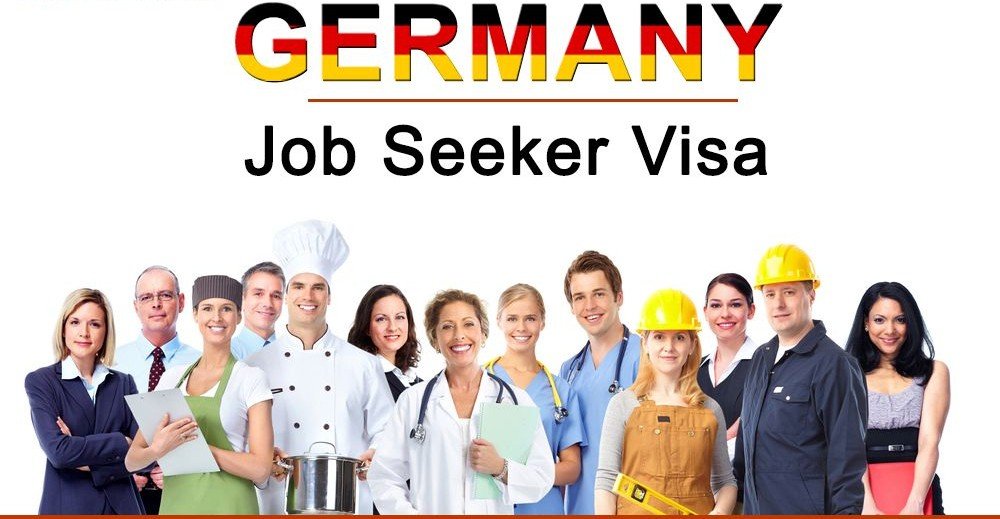Germany has become one of the top destinations in Europe for foreign workers in 2025. Thanks to its strong economy, aging population, and increasing job vacancies, the country is actively opening its doors to skilled professionals and tradespeople from across the globe.
One of the most popular ways to start a career in Germany is by securing a job with visa sponsorship. With this option, you can legally live and work in the country once you receive a job offer from a German employer.
From IT and engineering to healthcare, construction, logistics, and hospitality, Germany is in urgent need of foreign talent. If you are planning to work abroad this year, Germany should be high on your list of opportunities.
This guide covers the most in-demand jobs, visa types, salary expectations, and the requirements you need to land a visa-sponsored job in Germany in 2025.
Why Work in Germany in 2025?
- High demand for skilled workers across multiple industries.
- Employer-sponsored visas that provide a legal pathway to residency.
- Opportunities for career growth, permanent settlement, and family reunification.
- Competitive salaries and strong worker protections.
High-Demand Jobs in Germany for Foreigners
Germany faces a significant labor shortage in both high-tech and vocational fields. Many of these positions come with employer visa sponsorship, making relocation easier for non-EU applicants.
1. Information Technology (IT) and Software Development
Germany’s fast-growing tech sector has created thousands of opportunities for IT professionals.
- Common Roles: Software Developers, Data Scientists, Cloud Engineers, IT Consultants, Cybersecurity Experts
- Average Salary: €55,000 – €90,000 per year
- Visa Options: EU Blue Card or Skilled Worker Visa
- Requirements: Degree in computer science or related field, relevant experience, English proficiency (German is optional but helpful)
2. Healthcare and Nursing
Germany urgently needs healthcare workers to fill shortages in hospitals, clinics, and elderly care homes.
- Common Roles: Registered Nurses, Caregivers, Medical Assistants, Lab Technicians
- Average Salary: €32,000 – €50,000 per year
- Visa Options: Healthcare Skilled Worker Visa
- Requirements: Recognized medical qualifications, A2–B1 level German (mandatory), willingness to relocate
3. Engineering and Technical Fields
Engineering is the backbone of Germany’s economy, with growing demand in automotive, civil, and electrical sectors.
- Common Roles: Mechanical Engineers, Electrical Engineers, Civil Engineers, Automotive Engineers
- Average Salary: €50,000 – €75,000 per year
- Visa Options: EU Blue Card or Skilled Worker Visa
- Requirements: Engineering degree, relevant work experience, basic German preferred but not compulsory
4. Skilled Trades and Vocational Workers
Germany values vocational expertise, particularly in fields supporting infrastructure and housing.
- Common Roles: Electricians, Plumbers, Carpenters, HVAC Technicians, Welders
- Average Salary: €28,000 – €45,000 per year
- Visa Options: Skilled Worker Visa (with vocational training)
- Requirements: Recognized vocational training certificate, basic German skills
5. Logistics and Transport
As one of Europe’s biggest industrial hubs, Germany has a rising demand for logistics and transportation workers.
- Common Roles: Warehouse Workers, Forklift Operators, Delivery Drivers, Logistics Coordinators
- Average Salary: €26,000 – €38,000 per year
- Visa Options: Work Visa with employer sponsorship
- Requirements: Relevant training or experience, German optional for warehouse roles
6. Hospitality and Food Service
Tourism and hospitality are thriving again, creating opportunities in hotels, restaurants, and events.
- Common Roles: Cooks, Chefs, Housekeeping Staff, Restaurant Servers, Hotel Assistants
- Average Salary: €22,000 – €35,000 per year
- Visa Options: Seasonal or full-time employment visa
- Requirements: Basic experience, A1–A2 German preferred
How to Find Visa Sponsorship Jobs in Germany in 2025
Finding a visa sponsorship job in Germany is one of the most reliable ways for foreigners to legally live and work in the country in 2025. With thousands of open positions across industries like IT, healthcare, engineering, logistics, and hospitality, Germany is actively seeking international talent to fill critical labor shortages.
However, securing a job offer takes more than just sending random applications. You need a targeted strategy, the right resources, and an understanding of Germany’s visa system. This guide will walk you through proven steps to land a visa-sponsored job in Germany, along with the most common work visa types available for foreign professionals in 2025.
Step 1: Use Verified Job Portals Featuring Sponsored Roles
Start your search with trusted platforms that regularly publish listings for foreign applicants. Many of these specifically highlight visa sponsorship opportunities.
- Make-it-in-Germany.com – The official German government portal for skilled professionals.
- Indeed Germany – Search using terms like “visa sponsorship” or “relocation support.”
- LinkedIn Jobs – Filter by location (Germany) and keywords such as “visa” or “international applicants welcome.”
- StepStone.de – A German-based portal with many employer-sponsored jobs.
- XING Jobs – A professional networking site popular among German employers.
Tip: Always use precise keywords such as “visa sponsorship Germany 2025” or “relocation support” to narrow down legitimate postings.
Step 2: Apply Directly to Sponsorship-Friendly Companies
Many global companies headquartered in Germany are experienced in hiring foreign workers and handling visa sponsorship. Applying directly through their career pages increases your chances of success.
Examples include:
- IT & Engineering: SAP, Siemens, Bosch
- Healthcare: Charité, Vivantes, Helios
- Logistics & Automotive: Volkswagen, DHL, Deutsche Bahn
- Tech & Services: Zalando, Delivery Hero, FlixBus
Look for vacancies mentioning international recruitment, relocation assistance, or visa sponsorship.
Step 3: Work With Recruitment Agencies for Foreign Talent
Recruitment agencies can help connect you with verified German employers and guide you through the application and visa process. Some agencies specialize in certain industries like healthcare or skilled trades.
- Care With Care – Focused on nurses and caregivers.
- PersoCare – Healthcare recruitment specialists.
- ZAV (Zentrale Auslands- und Fachvermittlung) – Germany’s central placement office for foreign workers.
Step 4: Make Your Application Stand Out
German employers expect professional applications tailored to their job market. Prepare the following documents:
- German-style CV (Lebenslauf): Well-structured, maximum of 2 pages.
- Motivated Cover Letter: Personalized for each job, written in English or German.
- Certificates and Transcripts: Translated into German or English if necessary.
- Clear relocation statement: Mention “Willing to relocate and open to visa sponsorship.”
Step 5: Build a LinkedIn Profile That Attracts Recruiters
Your LinkedIn profile is often the first impression recruiters get. Optimize it for German employers by:
- Setting location preference to Germany.
- Using industry-specific keywords.
- Listing language proficiency and visa openness.
- Joining LinkedIn groups related to German hiring or relocation.
Step 6: Stay Alert to Job Scams
With the growing demand for foreign workers, scams are unfortunately common. Protect yourself by avoiding:
- Job offers that ask for upfront payment.
- Unverified agents claiming to guarantee visas.
- Employers refusing to provide official contracts.
Always apply through reputable platforms and verify company credentials before sharing personal information.
Visa Types Available for Foreign Workers in Germany (2025)
To work in Germany, you need the right visa. Employers usually sponsor one of the following work-related visas depending on your role and qualifications.
1. EU Blue Card
For: University graduates in skilled professions.
Minimum Salary (2025):
General roles: €45,300/year
Shortage professions (IT, doctors, engineers): €41,041.80/year
Benefits: Fast-track to permanent residency (21 months with German skills), family reunification, recognized across the EU.
2. Skilled Worker Visa (Fachkräftevisa)
- For: Workers with recognized vocational or academic qualifications.
- Eligible Roles: Nurses, educators, mechanics, tradespeople.
- Requirements: Recognized qualification, valid contract, A2–B1 German proficiency.
- Benefits: Long-term employment pathway with employer sponsorship.
3. General Employment Visa (Section 18 Residence Act)
- For: Jobs not covered under the EU Blue Card or Skilled Worker programs.
- Examples: Logistics staff, factory workers, hospitality staff.
- Requirements: Approved job contract and ZAV approval (to ensure no EU worker is available).
- Duration: Valid for the length of your contract, renewable.
4. Job Seeker Visa
- For: Applicants who want to move to Germany first to look for work.
- Validity: 6 months.
- Requirements: Recognized degree or training, proof of funds (~€1,200/month), A2 German skills.
- Note: You cannot work on this visa—once hired, you must switch to a work visa.
5. Seasonal Work Visa
- For: Short-term jobs in agriculture, hospitality, or events.
- Duration: Up to 90 days per year.
- Requirements: Employer contract and ZAV approval.
- Note: Typically arranged directly by employers through seasonal recruitment programs.
6. Intra-Company Transfer (ICT) Card
- For: Employees transferring to a German branch of their company.
- Requirements: At least 6 months of prior employment, transfer to a managerial or specialist role.
- Duration: Up to 3 years.
Top States in Germany Hiring Foreigners with Visa Sponsorship in 2025
Germany remains one of Europe’s strongest job markets, attracting thousands of skilled workers and professionals from around the world. With industries such as technology, automotive, engineering, logistics, and healthcare in high demand, international talent plays a crucial role in filling labor shortages.
In 2025, several German states (Bundesländer) stand out as leading destinations for foreigners seeking jobs with visa sponsorship. These regions not only host global companies but also provide structured pathways for relocation, integration, and long-term residency.
Below are the top states in Germany hiring foreigners with visa sponsorship in 2025, along with their key industries, opportunities, and salary expectations.
1. Bavaria (Bayern)
Capital: Munich
Why Bavaria Leads in Hiring Foreigners
Bavaria is Germany’s economic powerhouse, home to global giants like BMW, Audi, Siemens, and Allianz. Munich, in particular, is a hub for IT, automotive engineering, and finance, attracting thousands of skilled professionals each year.
- Key Industries Hiring: Automotive, Engineering, IT, Finance, Healthcare
- Major Companies: BMW, Audi, Siemens, Allianz, MAN, Infineon
- Visa Support: Employers offer relocation packages, EU Blue Card sponsorship, and English-speaking work environments in tech sectors.
Average Salaries in Bavaria (2025):
- Software Developer: €65,000 – €95,000
- Mechanical Engineer: €55,000 – €75,000
- Registered Nurse: €38,000 – €52,000
2. Baden-Württemberg
Capital: Stuttgart
Why It Stands Out
Known as the “home of German engineering”, Baden-Württemberg is where global automotive and manufacturing companies thrive. Stuttgart and Karlsruhe are major innovation centers for AI, robotics, and renewable energy.
- Key Industries Hiring: Automotive, Robotics, Engineering, Research, Healthcare
- Major Companies: Mercedes-Benz, Porsche, Bosch, SAP, Mahle
- Visa Support: Strong demand for foreign engineers, IT specialists, and skilled trades with visa sponsorship for shortage occupations.
Average Salaries in Baden-Württemberg (2025):
- Electrical Engineer: €55,000 – €78,000
- Data Scientist: €60,000 – €88,000
- Healthcare Worker: €32,000 – €45,000
3. Berlin
Capital: Berlin (city-state)
Why Berlin Attracts Global Talent
Berlin is Germany’s startup capital, known for its multicultural environment and high demand for tech, creative, and healthcare professionals. Many companies operate in English, making it one of the most foreigner-friendly states.
- Key Industries Hiring: IT, Startups, Creative Media, Healthcare, E-commerce
- Major Companies: Zalando, Delivery Hero, N26, HelloFresh, Charité Hospital
- Visa Support: Tech startups frequently sponsor visas, and Berlin’s international community makes relocation smoother.
Average Salaries in Berlin (2025):
- Software Engineer: €58,000 – €85,000
- UX/UI Designer: €45,000 – €70,000
- Nurse: €34,000 – €48,000
4. North Rhine-Westphalia (NRW)
Capital: Düsseldorf
Why It Stands Out
As Germany’s most populous state, NRW has a diverse economy covering logistics, energy, manufacturing, and finance. Cities like Cologne, Bonn, and Düsseldorf host international corporations with large foreign workforces.
- Key Industries Hiring: Logistics, Manufacturing, Energy, IT, Finance
- Major Companies: Deutsche Post DHL, Bayer, E.ON, Ford Europe
- Visa Support: Logistics and healthcare roles are highly in demand with work visa sponsorship.
Average Salaries in NRW (2025):
- Logistics Coordinator: €42,000 – €58,000
- Chemical Engineer: €50,000 – €72,000
- Warehouse Worker: €28,000 – €36,000
5. Hesse (Hessen)
Capital: Wiesbaden | Major City: Frankfurt am Main
Why Hesse Attracts Foreign Workers
Hesse is the financial hub of Germany, with Frankfurt being home to the European Central Bank (ECB), major banks, and global consultancy firms. It also offers strong opportunities in IT, healthcare, and aviation.
- Key Industries Hiring: Finance, IT, Aviation, Consulting, Healthcare
- Major Companies: Deutsche Bank, Lufthansa, Fresenius, Merck Group
- Visa Support: International professionals in finance and IT are in high demand, with competitive relocation support.
Average Salaries in Hesse (2025):
- Investment Banker: €70,000 – €120,000
- IT Specialist: €55,000 – €80,000
- Healthcare Technician: €34,000 – €46,000
Top German Companies Hiring Foreigners with Visa Sponsorship in 2025
Germany remains one of the most attractive destinations for foreign professionals in 2025. With a strong economy, advanced industries, and a clear pathway for international workers, the country is actively recruiting talent from abroad. Many leading companies in technology, engineering, healthcare, logistics, and manufacturing have well-established programs for visa sponsorship and relocation support, making Germany a top choice for skilled and motivated workers.
If you’re considering building a career abroad, here are the top German companies hiring foreigners with visa sponsorship in 2025, along with insights into salaries, eligibility requirements, and frequently asked questions.
Leading Companies Offering Visa Sponsorship Jobs in Germany
1. SAP SE
- Industry: Software & Enterprise Technology
- Hiring Focus: Software Developers, Cloud Engineers, AI Specialists
- Why It Stands Out: SAP is one of the most immigrant-friendly tech firms in Germany, offering relocation packages, visa assistance, and English-speaking work environments for international hires.
2. Siemens AG
- Industry: Engineering, Energy, Automation
- Hiring Focus: Electrical Engineers, IT Consultants, Project Managers
- Why It Stands Out: Siemens is a global engineering giant with operations worldwide. Its German offices regularly hire foreign professionals and provide full visa sponsorship.
3. Charité – Universitätsmedizin Berlin
- Industry: Healthcare
- Hiring Focus: Nurses, Lab Technicians, Medical Assistants
- Why It Stands Out: As one of Europe’s largest university hospitals, Charité actively recruits foreign medical professionals—particularly in nursing, where shortages are most severe.
4. Bosch Group
- Industry: Automotive, Engineering, Smart Home Technology
- Hiring Focus: Mechanical Engineers, Software Developers, System Designers
- Why It Stands Out: Bosch offers structured onboarding for skilled migrants, especially in R&D, and is known for supporting international employees through relocation and visa sponsorship.
5. Volkswagen Group
- Industry: Automotive Manufacturing
- Hiring Focus: Automotive Engineers, IT Security Analysts, Technicians
- Why It Stands Out: VW recruits globally to fill engineering and tech roles at its plants and innovation hubs, providing full relocation and visa sponsorship packages.
6. DHL Group (Deutsche Post)
- Industry: Logistics & Supply Chain
- Hiring Focus: Warehouse Operators, Drivers, Logistics Coordinators
- Why It Stands Out: DHL is one of the largest logistics firms in the world and recruits heavily from abroad—even for entry-level positions—with visa sponsorship opportunities.
7. Zalando SE
- Industry: E-commerce & Technology
- Hiring Focus: Software Engineers, UX Designers, Marketing Experts
- Why It Stands Out: Based in Berlin, Zalando is a multicultural, tech-driven company offering relocation and sponsorship benefits for international hires in IT and design.
8. Helios Kliniken
- Industry: Healthcare
- Hiring Focus: Nurses, Healthcare Aides, Physical Therapists
- Why It Stands Out: As one of Germany’s largest private hospital networks, Helios has long recruited foreign medical staff, particularly from outside the EU, to fill critical shortages.
Salary Expectations for Sponsored Foreign Workers in Germany (2025)
Germany offers competitive wages across industries. Foreign workers typically earn salaries comparable to their German counterparts, especially in high-demand fields. Salaries vary by sector, role, experience, and location (with Munich, Frankfurt, and Stuttgart offering higher pay due to higher living costs).
Here’s a breakdown of average annual salaries (gross) for visa-sponsored jobs in Germany in 2025:
Information Technology (IT)
- Software Developer: €55,000 – €85,000
- Cybersecurity Specialist: €60,000 – €95,000
- Data Analyst / Scientist: €58,000 – €90,000
- System Administrator: €45,000 – €65,000
Healthcare and Medical
- Registered Nurse: €36,000 – €50,000
- Healthcare Assistant / Caregiver: €28,000 – €42,000
- Medical Technician: €34,000 – €46,000
- Lab Assistant: €32,000 – €44,000
Engineering and Technical Roles
- Mechanical Engineer: €50,000 – €70,000
- Electrical Engineer: €52,000 – €75,000
- Civil Engineer: €48,000 – €68,000
- Industrial Technician: €38,000 – €55,000
Vocational and Skilled Trades
- Electrician / Plumber / HVAC: €32,000 – €45,000
- Welder / Fitter: €30,000 – €42,000
- Automotive Technician: €35,000 – €48,000
- Construction Worker: €28,000 – €40,000
Logistics and Warehouse
- Warehouse Operator: €26,000 – €35,000
- Forklift Driver: €27,000 – €36,000
- Logistics Coordinator: €40,000 – €55,000
- Delivery Driver: €28,000 – €38,000
Hospitality and Food Service
- Chef / Cook: €25,000 – €35,000
- Hotel Receptionist: €22,000 – €30,000
- Housekeeper / Waiter: €20,000 – €28,000
- Restaurant Supervisor: €30,000 – €38,000
Minimum Wage in 2025: €12.41 per hour. Most sponsored roles exceed this threshold, which is important for residency eligibility.
Eligibility Requirements for Visa Sponsorship Jobs in Germany (2025)
To legally work in Germany with employer sponsorship, foreign applicants must meet specific requirements. These may vary by job type and visa category, but the essentials include:
Valid Passport – Minimum 6 months validity beyond your stay, with blank visa pages.
Recognized Qualifications or Experience – Use the ANABIN database to confirm recognition of your degree or vocational training.
Signed Employment Contract – Must include minimum salary, job duties, and working hours.
Language Skills –
German (A2–B1) is required for healthcare, trades, and hospitality.
English is often enough for IT, engineering, and research roles.
Professional Licenses (if applicable) – Required for regulated jobs like medicine, nursing, or engineering.
Proof of Financial Stability – Especially for job seeker visas (approx. €11,208 in a blocked account).
Health Insurance – Compulsory for all foreign workers.
Clean Records – Police clearance and medical fitness certificate.
Why Germany Is a Top Choice for Sponsored Workers in 2025
Germany is not only Europe’s largest economy but also one of the most welcoming countries for foreign professionals. With structured visa pathways, strong labor protections, and high wages, international workers have the chance to build long-term careers.
Employer-sponsored visas also open doors to:
- Permanent residency after a few years.
- Family reunification with work rights for spouses.
- Access to Germany’s social security and healthcare systems.
For foreign workers in 2025, Germany offers far more than just a job—it offers stability and a future.
FAQs – Working in Germany with Visa Sponsorship
1. Can I apply for jobs in Germany without speaking German?
Yes. Many IT, research, and engineering roles are open to English speakers. However, German is often required for healthcare, trades, and hospitality jobs.
2. How long does it take to process a German work visa?
On average, 4–12 weeks, depending on your country of residence and visa category.
3. What’s the minimum salary for visa sponsorship?
In 2025:
- €45,300 (general roles)
- €41,041.80 (shortage occupations like IT, healthcare, engineering).
4. Can I bring my family?
Yes. Most visas, including the EU Blue Card and Skilled Worker Visa, allow family reunification.
5. What if my degree isn’t recognized?
You may need to apply for credential recognition through ANABIN or ZAB before your visa can be approved.
6. Are there opportunities without a degree?
Yes. Skilled trades, logistics, and hospitality jobs are open to candidates with vocational training or relevant experience.
7. Is visa sponsorship free?
Yes. Employers cover sponsorship. You only pay official embassy visa fees. Avoid scams from agents demanding money.
Final Thoughts
If you are looking for a career abroad, Germany is one of the best countries for foreigners seeking jobs with visa sponsorship in 2025. With competitive salaries, strong legal protections, and clear pathways to residency, international professionals can build both their careers and their future here.
From global tech firms like SAP to healthcare giants like Charité and Helios, Germany’s employers are actively recruiting skilled talent worldwide. Now is the right time to take advantage of these opportunities and start your journey to working and living in Germany.








